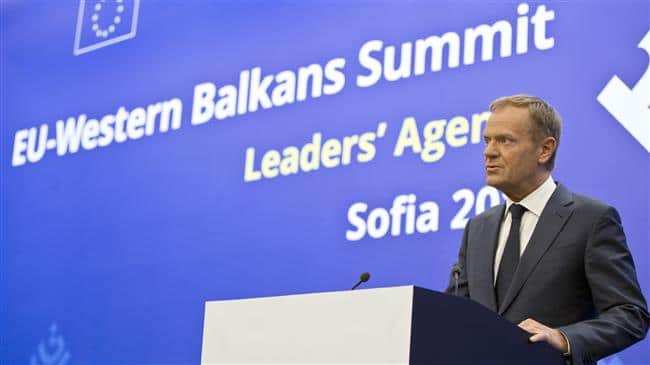UPDATE 1320 GMT: London-based Pergas, an international consortium, signed a preliminary deal to develop an Iranian oilfield.
Pergas and the National Iranian South Oil Company confirmed the heads of agreement to produce 655 million barrels of oil over the next 10 years from the Keranj field in Khuzestan Province in southwest Iran,.
British Ambassador to Tehran Rob Macaire and Pergas managing director Colin Rowley attended the signing ceremony in Tehran.
“We hope that the UK government…endorses the agreement,” Iranian Oil Minister Bijan Zanganeh said.
UPDATE 1300 GMT: French President Emmanuel Macron has said, upon arrival for a summit in Bulgaria:
International companies with interests in many countries make their own choices according to their own interests. They should continue to have this freedom.
But what is important is that companies and especially medium-sized companies which are perhaps less exposed to other markets, American or others, can make this choice freely.
Meanwhile, Iran Oil Minister Bijan Zanganeh has repeated that if French energy giant Total abandons a $4.9 investment deal in the South Pars gas field development, a Chinese company is ready to step in:
Total has said that if it doesn’t get an exemption from the United States to continue its work, it will begin to pull out of the deal. If that happens, the Chinese firm CNPC will replace Total.
In a press release on Wednesday, Total said it will pull out of Phase 11 of the South Pars project because of the US withdrawal from the nuclear deal, unless it gets a waiver from American sanctions.
Total signed the memorandum of understanding for the investment last July, but it held off all investment except for $90 million in exploratory work because of uncertainty over the US position.
Officials of the 28-nation European Union considered their options over the Iran nuclear deal, threatened by last week’s withdrawal by the Trump Administration, in a meeting in Brussels on Wednesday.
The EU’s executive gathered a day after Iranian Foreign Minister Mohammad Javad Zarif met EU foreign policy head Federica Mogherini and counterparts from Britain, France, and Germany — the three European countries who joined the July 2015 deal along with the US, China, and Russia.
“We don’t want to see this agreement destroyed because it is important for maintaining peace in the region and also for peace in the whole world,” European Commission President Jean-Claude Juncker said. “Ending this agreement would be a major threat to security in this region.”
Ministers of the 28 members considred the situation further at a dinner in Sofia, Bulgaria on Wednesday evening.
Few details were given of the deliberations. However, the executive confirmed that it discussed a blocking statute, which would shield European companies trading and investing with Iran.
Existing US sanctions threaten firms with punishment if they have an American connection, such as an affiliate or use of US components, and if they maintain links with the Islamic Republic. Donald Trump’s order last week demanded that foreign companies end their business with Iran, including its energy and financial sectors.
European Commissioner Dimitris Avramopoulos told reporters of consideration of “concrete, practical solutions to make sure the European Union can continue to live up to its commitments under the deal and protect our economic operations”. He added, “We did discuss the possibility of applying our blocking statute. We are ready to do so if needed.”
Maja Kocijancic, Mogherini’s spokeswoman, had said after Tuesday’s meeting with Zarif:
We are exploring options to protect the economic operators from the extra-territorial effects of re-imposed sanctions. We will work with all the partners to address possible negative impacts on economic operators of any re-imposition of sanctions by the US.
But UK Foreign Minister Boris Johnson was far more cautious: “We have to be realistic about the electrified rail, the live wire of American extraterritoriality and how [it] can serve as a deterrent to business.”
See Iran Daily, May 16: Europeans Make No Commitment Over US Sanctions
Iran has given the EU “between 45 and 60 days to give the necessary guarantees to safeguard Iranian interests and compensate the damages caused by the US pullout”.
Speaking before Wednesday’s executive meeting, EU President Donald Tusk was unsparing in his criticism of Donald Trump and said Europe should be prompted to consider its options independently of the US:
Looking at latest decisions of @realDonaldTrump someone could even think: with friends like that who needs enemies. But frankly, EU should be grateful. Thanks to him we got rid of all illusions. We realise that if you need a helping hand, you will find one at the end of your arm.
— Donald Tusk (@eucopresident) May 16, 2018
Tusk said, “I would like our debate to reconfirm without any doubt that as long as Iran respects the provisions of the deal, the EU will also respect it.”

